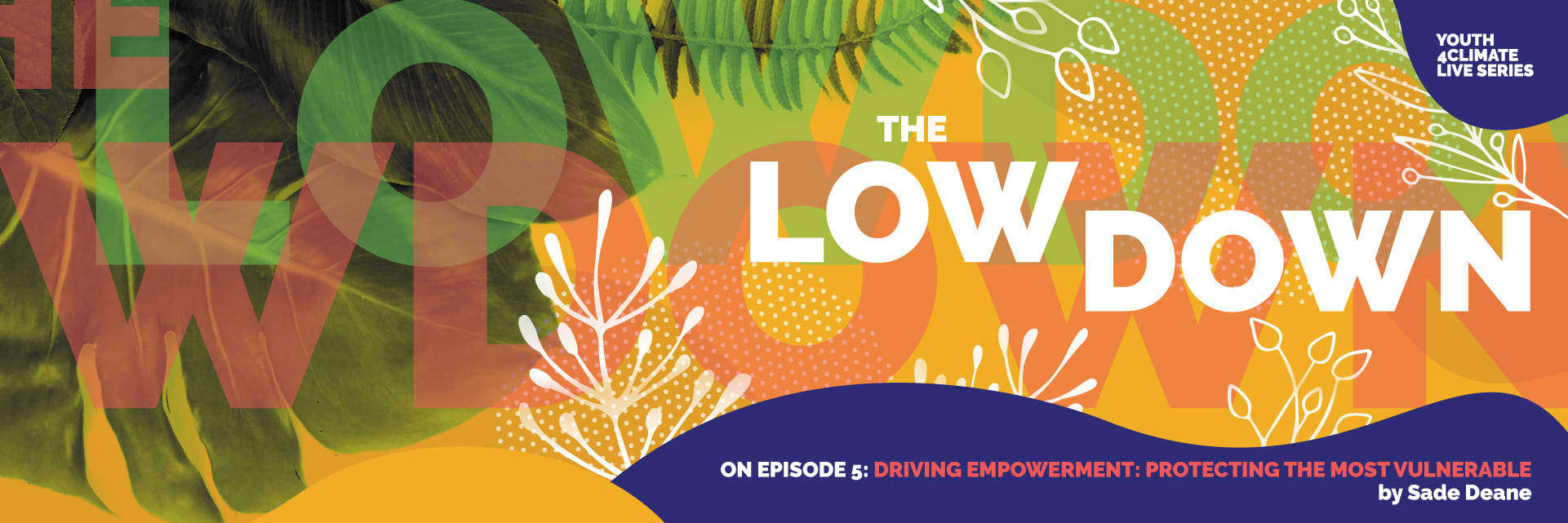
Did you know that certain nations and populations are disproportionately impacted by climate change? Vulnerable groups we should bear in mind include: the homeless, the elderly, children, youth, women, indigenous people and the disabled. We must amplify the voices of vulnerable groups and improve representation to ensure that climate policy is equitable and addresses their concerns.
At the start of #Youth4ClimateLive Episode 5, “Driving Empowerment: Protecting the Most Vulnerable,” the audience was asked a question: “Of the following groups, who do you think will be the most affected by climate change?” Here are the results:
-
Women-6%
-
Agricultural Communities-13%
-
Children and Youth- 19%
-
Coastal Communities- 25%
-
Climate change affects everyone equally- 38%
Most voted that climate change affects everyone equally—but the rest of the episode would challenge this notion and, through the testimonies of youth working to make a difference, highlight the disparities in peoples’ experiences.
Following on from the poll, we segued into some encouraging words and insight on climate action programming at the macro level from two climate policy experts: Emanuela Del Re, Italy’s Vice Minister of Foreign Affairs and International Cooperation, and Amina Mohammed, United Nations Deputy Secretary-General.
Minister Emanuela Del Re shared the three priority areas in which Italy will be focusing on implementing climate action: Food Security, Education and Gender Equality. Within education are the subcategories of climate literacy, information, training and awareness. The way forward is intentional, as Italy has developed a Global Citizenship Education strategy that will transform the attitudes and behaviours of their youth and citizens, making sustainable development part of their everyday lives. This strategy is linked to the UN’s Sustainable Development Goals to increase awareness.
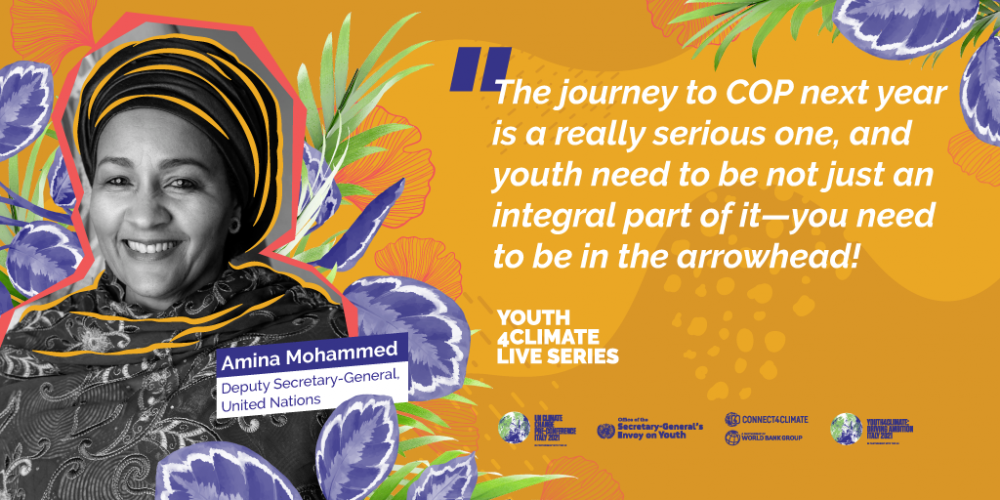
United Nations Deputy Secretary-General Amina Mohammed highlighted youth’s strong voice for change and transformation and the urgency we bring to the table, saying that young leaders have helped wake up those who have been at this 25 to 30 years. Mohammed sees an opportunity to enhance cross-generational partnership and bridge gaps on climate change negotiations. Our rejection of statements without action is helping to ensure there is more accountability from leaders. If this is not empowering to other young people, I don't know what is. Mohammed also reminded us that one day we will have to be on the other side (policy leadership), where we will have to take the mantle from other leaders and see the fight against climate change through to the finish line. Increasing our presence on the global stage is vital so that youth leaders can connect with policymakers face-to-face on these issues. Therefore, Mohammed encouraged us to capitalize on all the opportunities around COP 26.
Up next were our vibrant youth speakers, who highlighted the experiences of some of the world’s most vulnerable groups by addressing them through their own climate action initiatives in their respective realities.
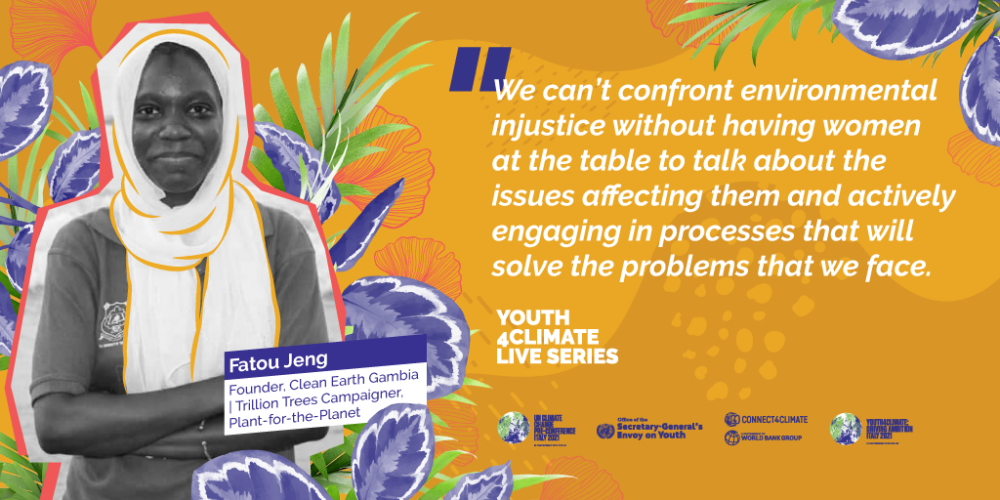
Women and Gender Equality
One of the moderators asked our first panelist, Clean Earth Gambia founder Fatou Jeng, a big question: “What are the best ways to include women and girls in decision-making and harness their knowledge in leadership?”
Our panelist started by setting the context of the gender inequalities in the leadership of the Gambia and globally in the UNFCCC. Women make up the majority of the Gambia’s population but contribute very little to the climate crisis. Nonetheless, they bear the greatest burden from climate impacts. In the Gambia’s Parliament, there are only six women: three elected and three nominated by the president. The Gambia’s cabinet contains over 40 ministries, yet only four of them are headed by women. At the annual Conference of the Parties to the UNFCCC, female delegates account for only 30% of delegates, highlighting the gender gap in decision-making and leadership.
Fatou shared a few possible solutions, such as a Gender Quota System allowing women to speak directly on the issues impacting them in this climate crisis. She also believes this will help close the gap in access to climate information for women. Another option she touched on is strengthening the Action for Climate Empowerment (ACE) process with an emphasis on capacity-building of women. The six elements of ACE to consider for the empowerment of vulnerable groups are: education, training, public awareness, public access to information, public participation and international cooperation.
Fatou also shared insights on skilled homebound women, indicating they can partner with existing organisations who focus on women. But she made clear that it's the onus of the organisation to reach out to these women to find these skills. Women can develop worthwhile partnerships that will empower other women and drive climate action.
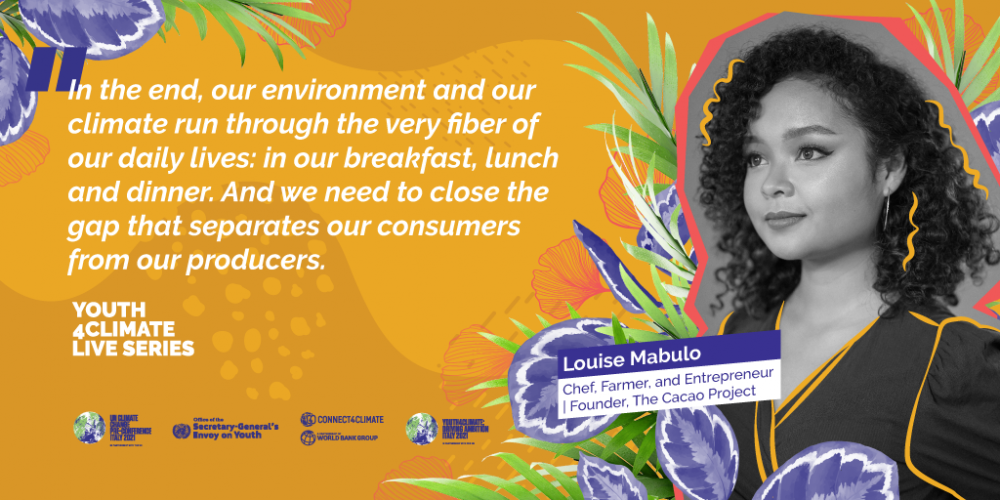
Agricultural Resilience and Stigmatized as a Career Choice
The moderator asked our second Panelist, Cacao Project founder Louise Mabulo, what climate change means for farmers in the Philippines, and invited her to share lessons learned that may be applicable in other regions.
She emphasised that farmers are the most climate-vulnerable group in the Philippines because of their livelihoods’ direct connection to the weather conditions where they live. Climate change in the region has already led to more intense typhoons—a major concern for the Philippines given the country’s situation in the typhoon belt. These circumstances were the basis for the Cacao Project, which aims to build resilience for farmers and ensure the food system can thrive alongside nature—e.g., through the use of innovative agricultural forests.
Louise noted that agricultural work still carries a negative stigma, which she has been helping with to deconstruct through her work. She believes that farming is a viable career choice, as it is able to generate many jobs and creates a food system with accessible and resilient options for production.
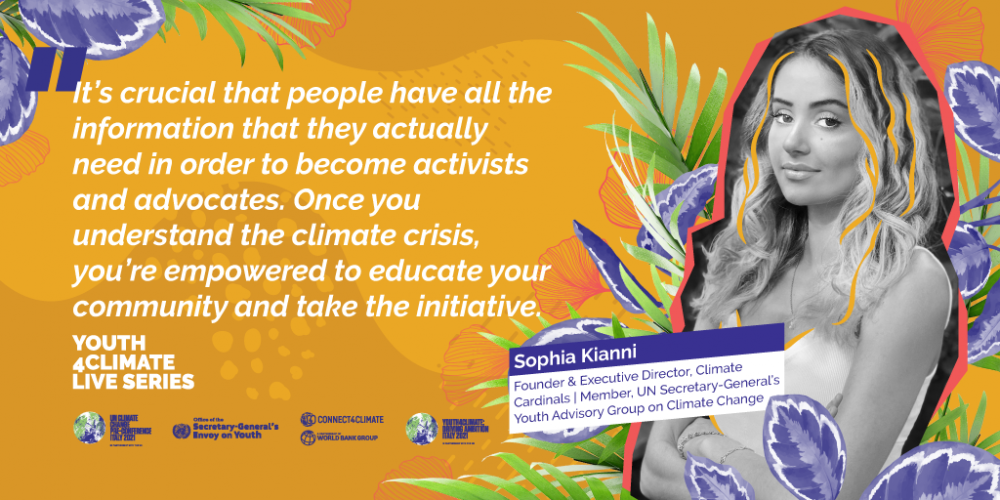
Climate Literacy Barriers
Our third youth panelist, Climate Cardinals founder and UN Youth Advisory Group on Climate Change member Sophia Kianni, was asked to elaborate on her efforts to ensure everyone has access to climate change information in their own languages.
Sophia was motivated to close the gaps in climate change knowledge when she realised that her parents and students in Iran were largely unaware of climate change and environmental issues. She then started to translate climate change information into her relatives’ native language, Persian, and taught them about what’s happening to the climate. This led her to found Climate Cardinals, which allowed other young people around the world to translate climate information into their own languages—work for which they receive community service hours. This effort has enabled her to reach 6,000 young people in 41 countries and translate 200,000 words of climate information into over 100 languages. Partnership with credible institutions is part of Sophia’s ongoing strategy to break down these barriers.
Even at the UN, she notes, climate information is only rendered in 6 languages. Expanding on these will equip leaders from vulnerable groups to fully understand and advocate on issues of climate change.
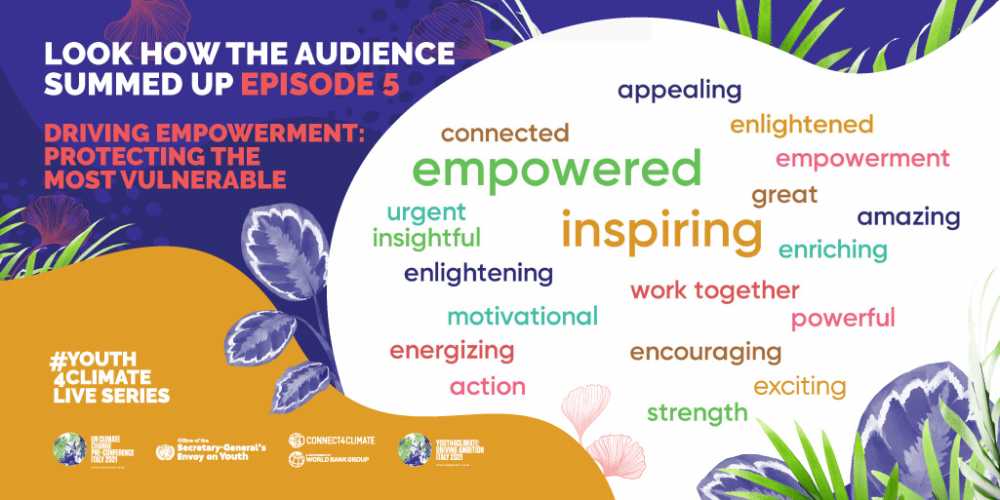
Final Takeaways
Sophia wrapped up with some final takeaways, reminding us that everyone has a part to play and encouraging us to get involved wherever and however we can. Fatou also encouraged us to take action, regardless of whether or not we feel climate change’s impacts yet. Lastly, Lousie encouraged us to harness our resources to make tangible change.
The audience then had an opportunity to sum up their thoughts on the episode by taking a two-question poll. In response to the first question, “In one word, how would you sum up today's conversation?,” the audience suggested words such as inspiring, appealing, enlightened, urgent, strength, motivational, and connected (to name just a few). Then, when asked, “How do you think your government can best enhance equitable inclusion of vulnerable communities in climate action?”, they chose from the following options:
-
Provide environmental education - 23%
-
Host community consultations- 10%
-
Fund projects to increase resilience of vulnerable communities- 10%
-
All of the above- 56%
-
Other 3%
The leading result was “All of the above,” which I can agree with, as there is no single one-size-fits-all way to go when it comes to managing this climate crisis among vulnerable groups.
We understand we have a crisis on our hands that requires sustainable solutions. Gender balance, climate literacy, and agricultural advocacy are all essential if we’re to protect people’s livelihoods and meaningfully combat the effects of climate change worldwide. Ultimately, we’re all in this together, but we have to acknowledge that some are more vulnerable to climate impacts than others and implement climate policy prioritizing those in harm’s way.



